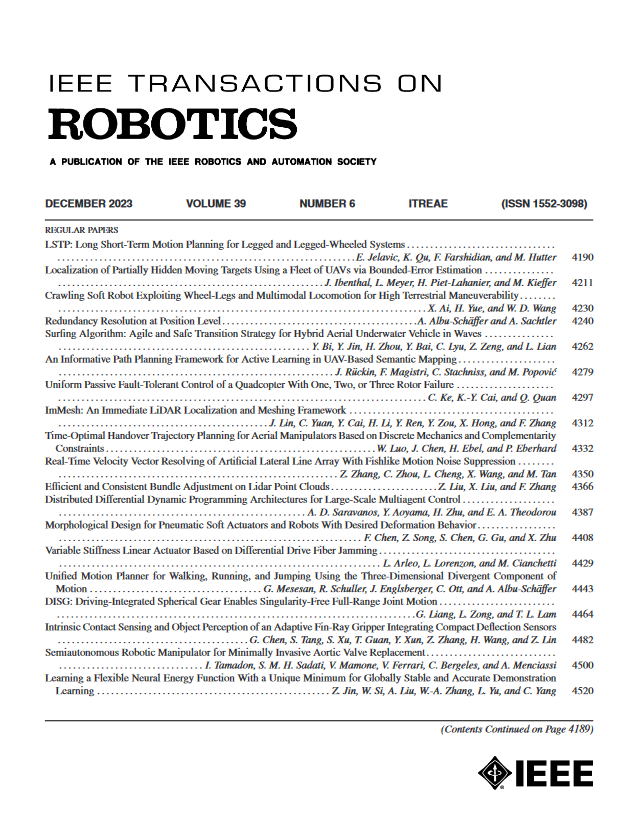高级机器人操作共享自治的基线策略自适应与抽象
IF 10.5
1区 计算机科学
Q1 ROBOTICS
引用次数: 0
摘要
本文提出了一种新的共享自治和基线策略适应框架,用于高级上下文感知机器人任务中的人机交互。利用独特的方法,利用决策中的层次结构和人类政策的变分分析,我们提出了一个共享自治政策的数学模型。该框架旨在实现可解释的高层决策,使机器人在人的控制下高效运行。我们在一种称为策略适应的算法中使用分层马尔可夫决策过程对决策过程进行建模,其中自治系统策略被适应,因此通过结合与机器人、人、任务和预训练相关的设计变量来形成。通过在多智能体分层上下文中集成深度强化学习,我们提出了一种端到端算法来训练为共享自治设计的基线策略。我们展示了我们的框架的有效性,特别是不同设计元素和人类技能水平之间的相互作用,在模拟高级拾取任务序列的人类用户的试点研究中。提出的框架推进了机器人任务共享自治的最新技术,但也可以应用于其他自主操作领域。本文章由计算机程序翻译,如有差异,请以英文原文为准。
Baseline Policy Adapting and Abstraction of Shared Autonomy for High-Level Robot Operations
This article presents a novel shared autonomy and baseline policy adapting framework for human–robot interactions in high-level context-aware robotic tasks. With a unique methodology that leverages hierarchies in decision-making as well as variational analysis of human policy, we propose a mathematical model of shared autonomy policy. The framework aims at interpretable high-level decision-making for efficient robot operation with human in the loop. We modeled the decision-making process using hierarchical Markov decision processes in an algorithm we called policy adapting, where the autonomous system policy is adapted, and hence shaped by incorporating design variables contextual to the robot, human, task, and pretraining. By integrating deep reinforcement learning within a multiagent hierarchical context, we present an end-to-end algorithm to train a baseline policy designed for shared autonomy. We showcase the effectiveness of our framework, and particularly the interplay between different design elements and human’s skill level, in a pilot study with a human user in a simulated sequence of high-level pick-and-place tasks. The proposed framework advances the state of the art in shared autonomy for robotic tasks, but can also be applied to other domains of autonomous operation.
求助全文
通过发布文献求助,成功后即可免费获取论文全文。
去求助
来源期刊

IEEE Transactions on Robotics
工程技术-机器人学
CiteScore
14.90
自引率
5.10%
发文量
259
审稿时长
6.0 months
期刊介绍:
The IEEE Transactions on Robotics (T-RO) is dedicated to publishing fundamental papers covering all facets of robotics, drawing on interdisciplinary approaches from computer science, control systems, electrical engineering, mathematics, mechanical engineering, and beyond. From industrial applications to service and personal assistants, surgical operations to space, underwater, and remote exploration, robots and intelligent machines play pivotal roles across various domains, including entertainment, safety, search and rescue, military applications, agriculture, and intelligent vehicles.
Special emphasis is placed on intelligent machines and systems designed for unstructured environments, where a significant portion of the environment remains unknown and beyond direct sensing or control.
 求助内容:
求助内容: 应助结果提醒方式:
应助结果提醒方式:


